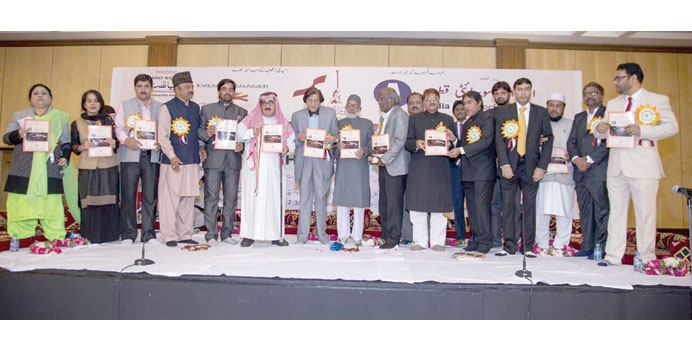LAUNCH: Poets along with the chief guest and IUS officials at the launch of IUS magazine at the start of mushaira.
By Umer Nangiana
Mere Maalik teri azmat ka pata deta hai Sari duniya ke muqabil mera tenha hona
(My Lord, your greatness reflects in that I have been able to stand alone against the whole world)
If you were looking for a perfect conclusion to a picture-perfect evening of poetry, it was provided by Professor Waseem Barelvi, as promised by his presence among a galaxy of Urdu poets.
A packed house at the recently concluded Aalmi Mushaira 2015 (poetry symposium) organised by India Urdu Society Qatar, which coincided with Qatar National Day, was swayed by Barelvi presenting some of his never-heard-before ghazals (a popular genre of Urdu poetry) in Taranum (a style where the poet sings the verses).
Barelvi, one of the most eminent contemporary Urdu poets, was handed the responsibility to end the symposium on the same poetic note it started with. And the creator of couplets like ‘Atay atay mera naam sa reh gaya, Us ke honton pe kuch kanpta reh gaya’ (She was about to utter my name and her lips just quivered) did not disappoint an audience of more than a thousand people.
The Giwana Hall at Radisson Blu was jam packed with people, with dozens seen standing up or sitting on the floor as they gathered for the love of Urdu poetry, delivered to them by an array of poets from India and Pakistan.
“It was the first time that people in so huge numbers attended a mushaira in Qatar, as it was planned to coincide with Qatar’s National Day. Hundreds attended the hours-long symposium and it shows how big a success it was,” Ateeq Anzar, founding president of India Urdu Society-Qatar (IUS) told Community.
Advisor to Qatar’s Ministry of Arts, Culture and Heritage, Moosa Zainal Moosa, was the guest of honour and he spoke in Arabic about Qatar’s brief history and the National Day. His speech was translated for the audience at the spot.
Barelvi, who presided over the mushaira, has been to Qatar before as well, however, this was by far the largest audience he received here. Born in Bareilly Uttar Pradesh in 1940, Barelvi completed his MA in Urdu literature from Agra University in 1958 and started his career as an Assistant Professor and later became an Associate Professor and Head of Urdu Dept Bareilly college, Bareilly. He has also served as the Vice Chairman of National Council for Promotion of Urdu Language, Ministry of Human Resource Development in India.
Winner of several national and international awards, Barelvi’s poetry has been published in scores of literary magazines in India, Pakistan and other countries. His ghazals and other compositions have been sung by prominent singers in India. He has published more than six collections of poetry in Urdu and two in Hindi.
Some of his important books are Tabassum-e-Gham (Urdu), Aansu Mere Daman Tera (Hindi), Mizaj (Urdu), Aankh Aansu Hui (Urdu), Mera Kya (Hindi, Urdu), Aankhon Aankhon Rahe (Urdu), and Mausam Andar Bahar Ke (Urdu).
Celebrated names in Urdu poetry, Rahat Indori and Dr Majid Deobandi were the guests of honour from India. Poet Abbas Tabish was the guest of honour from Pakistan.
Indori, born in 1950 in Indore, India, went to Nutan School Indore from where he completed his Higher Secondary. He completed his graduation from Islamia Karimia College Indore in 1973 and passed his MA in Urdu literature from Barkatullah University Bhopal (Madhya Pradesh) in 1975.
Equally competent in prose and poetry, Rahat was awarded a PhD in Urdu literature from the Bhoj University of Madhya Pradesh in 1985 for his thesis titled ‘Urdu Main Mushaira.’
He started teaching Urdu literature in IK College, Indore. He became very busy with mushairas and started receiving invitations from all over India and abroad. He quickly became a well-known figure in the world of Urdu literature. He recited his first couplet in his college days when he was only 19. In those days his style of writing was surprising, advanced and had a freshness to it.
Other poets at the symposium included Dr Tabish Mehdi, Dr Naseem Nikhat, Abrar Kashif, Sohail Usmani, Rashid Alam, Ateeq Anzar, Shad Akolvi, Jaleel Nizami, Mahtab Alam, Hasan Kazmi, Dr Tarannum Riyaz and Bedhadak Madrasi.

